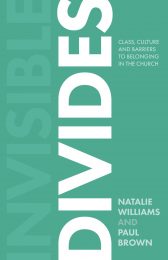 Invisible Divides is one of the most helpful, practical and down-to-earth books I have read for many years, and two of my friends who lead churches among deprived communities in my city agree. They are devouring it and applying it in their ministries.
Invisible Divides is one of the most helpful, practical and down-to-earth books I have read for many years, and two of my friends who lead churches among deprived communities in my city agree. They are devouring it and applying it in their ministries.
I have the privilege of knowing both Natalie and Paul, and greatly appreciate the way in which they address the sensitive topic of class in the church. ‘Working class’ is often considered an unacceptable term, but the authors address and use it unashamedly as they explain, from their own experience, the huge cross-cultural barriers there are for someone from the ‘working class’ joining a ‘middle class’ church. They deal honestly, with a disarming degree of self-mockery, with some of the ways in which being introduced into a middle class church when they first became believers produced embarrassing and sometimes amusing situations.
But this book is not written to amuse. It is poignant for high-lighting how hard it can be to cross cultural boundaries and how both parties, the visitor and the host, need to be sensitive to the ways in which we use language, how we ask questions (which may be interpreted as interrogation rather than genuine interest) and how we can appear to be imposing our ‘norm’ on someone else assuming it is their ‘norm’ too.
The book has three parts: 1. Is class an issue? 2. Different ways we think and act. 3. Church Life. Each part has its challenges and revelations, and calls for careful and self-searching reading. Indeed, I embarrassingly found myself recognising ways in which I have unwittingly not done well when seeking to interact with people from different backgrounds from my own. But it is not written to condemn but rather to equip you to do better.
The final chapter, particularly, has caused me to reflect. It asks why people from working class backgrounds without A levels and degrees are rarely included in the leadership of churches. A good question. Do we have the correct expectations when we seek who should be leaders? I am mindful of one excellent elder in an African church I have worked with who is not even literate – but he is very wise and effective in his leadership! Maybe we need more like him in ‘western’ churches and, indeed, Natalie and Paul cite three examples from their own contacts where this has happened.
I have already recommended and given Invisible Divides to several friends and I now urge you to read it. It will really help give you insights and understanding on many issues that you may not have previously considered.
